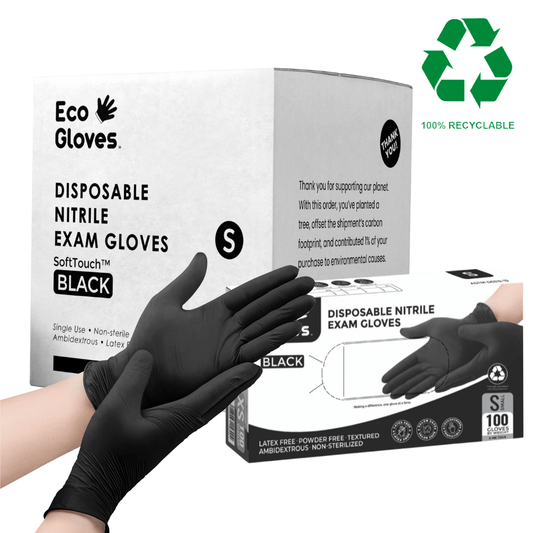A Comprehensive Review Of The Best Disposable Gloves For Mechanics
Eco GlovesIn the world of automotive repair, mechanics require gloves that can endure the harsh demands on the job. From handling chemicals to performing intricate repairs, the right disposable gloves offer essential protection while ensuring comfort and dexterity. In this article, we’ll explore the top disposable gloves for mechanics, highlighting the specific qualities that make them ideal for automotive work, with a focus on durability, chemical resistance, and eco-friendliness.
Topics Covered
- Understanding The Specific Needs Of Mechanics
- Top Glove Materials For Automotive Work
- Review Of Top Disposable Glove Brands For Mechanics
- Protect Your Hands And The Planet With Eco Gloves
- Key Takeaways: Choosing the Best Disposable Gloves for Mechanics
-
Frequently Asked Questions About Disposable Gloves for Mechanics
Understanding The Specific Needs Of Mechanics
Mechanics work in an environment filled with a variety of potentially hazardous substances. From oils and lubricants to brake fluid, engine coolant, and solvents, mechanics need gloves that can stand up to the demands of daily automotive work. The primary needs of mechanics when it comes to disposable gloves are durability and chemical resistance, which are essential to ensure safety and comfort throughout their tasks.
1. Durability
Mechanics handle sharp tools and small parts regularly, making puncture and tear resistance a top priority. Disposable gloves that lack sufficient strength will easily rip, compromising the protection they provide. Durability is particularly important when mechanics are working in conditions that involve moving heavy objects or interacting with abrasive surfaces, such as under the hood of a car. A well-durable glove can last through the toughest jobs without needing frequent changes, saving time and providing uninterrupted protection.
Nitrile gloves, especially those designed for heavy-duty use, offer mechanics the strength they need. The material’s flexibility also allows for greater hand movement, which is crucial when performing delicate tasks like tightening screws or working with wiring.
2. Chemical Resistance
The automotive industry involves frequent exposure to harmful chemicals that can irritate or even damage skin. Mechanics frequently come into contact with chemicals such as:
- Engine oil
- Brake fluid
- Transmission fluid
- Solvents and degreasers
- Antifreeze (ethylene glycol)
Disposable gloves used by mechanics must have a high level of chemical resistance to prevent harmful substances from penetrating the material and causing skin irritation or more serious issues like chemical burns. Nitrile gloves are widely known for their superior chemical resistance, providing protection against oils, fuels, and even certain acids.
3. Grip and Dexterity
In addition to durability and chemical resistance, mechanics need gloves that offer a reliable grip and flexibility. Working with oily or greasy car parts can make it difficult to hold tools securely, and gloves with textured surfaces provide better control. Mechanics also need to maintain finger dexterity to perform intricate tasks, such as tightening small nuts or bolts or handling delicate engine components.
Disposable gloves with textured fingertips or palms can enhance grip, while nitrile gloves often offer a balance between thickness for protection and flexibility for dexterity. This combination ensures that mechanics can work safely without compromising precision.
3. Thickness
Lastly, when selecting disposable gloves for mechanic work, the thickness of the glove is a critical factor in ensuring both protection and functionality.
Glove thickness is measured in "mils," with 1 mil being equivalent to one-thousandth of an inch. The thickness of a glove plays a significant role in its durability, chemical resistance, and tactile sensitivity, all of which are important for mechanics working in demanding environments.
For mechanic use, gloves that range from 5 to 7 mils in thickness are typically the most suitable because they provide the puncture resistance needed to protect against cuts and tears, ensuring the glove holds up under tough conditions. Thicker gloves last longer, reducing the need for frequent changes during a shift, saving both time and material. Additionally, gloves in the 5-7 mil range offer enhanced chemical resistance, providing a stronger barrier between the skin and harmful substances. This extra thickness helps prevent chemical penetration, reducing the risk of irritation or burns.
Top Glove Materials For Automotive Work
Here’s a breakdown of the key disposable glove materials suitable for mechanics:
1. Nitrile Gloves
Widely regarded as the best option for mechanics, nitrile gloves offer superior chemical resistance and puncture protection. Unlike latex gloves, they are also hypoallergenic, making them a suitable choice for those with latex allergies. Nitrile gloves are designed to resist many of the harsh chemicals found in automotive work, such as brake fluid and solvents.
2. Vinyl Gloves
While vinyl gloves are often more affordable, they offer lower durability and chemical resistance compared to nitrile. However, they are useful for quick tasks that don’t require heavy handling of chemicals or sharp objects.
3. Latex Gloves
Latex gloves provide excellent dexterity and comfort, but their chemical resistance is limited. In fact, their prolonged exposure to harsh automotive fluids and chemicals can lead to quicker degradation than with nitrile material. Additionally, latex can cause allergic reactions in some individuals, making nitrile a safer alternative for those with sensitivities.
Review Of Top Disposable Glove Brands For Mechanics
1. Eco Gloves Black Disposable Nitrile Exam Gloves
These Eco Gloves Black Disposable Nitrile Exam Gloves (5 Mil) are designed for durability and protection, making them ideal for industries requiring heavy-duty hand safety, such as automotive, industrial, and cleaning sectors. With a 5 mil thickness, they offer exceptional puncture and tear resistance, ensuring long-lasting use during tough tasks. Whether you're handling harsh chemicals, performing detailed work, or need reliable barrier protection, these gloves provide the strength and grip needed for demanding environments. The powder-free and latex-free design makes them safe for those with latex sensitivities.
Pros
- Durable and resistant to punctures and tears.
- Provides excellent chemical resistance, ideal for industrial and automotive applications.
- Thicker material offers a superior grip in wet or oily conditions.
Cons
- Thicker design may slightly reduce tactile sensitivity.
- Less flexibility compared to thinner gloves.
2. Adenna Dark Light Nitrile Gloves
These nitrile gloves are designed for heavy-duty work, offering excellent puncture and tear resistance. Mechanics who need gloves for long hours of work or multiple tasks involving chemicals will appreciate the strength and protection these gloves provide. They come in a thicker design, which makes them more durable but slightly less flexible than thinner gloves.
Pros
- Highly durable and resistant to tearing.
- Provides excellent protection against chemicals used in automotive work.
- Thicker design ensures gloves last longer during tough tasks.
Cons
- The thicker material may reduce tactile sensitivity and dexterity.
- Slightly more expensive than other brands due to its heavy-duty design.
3. Gloveworks HD Nitrile Gloves
Gloveworks HD gloves are known for their high durability and chemical resistance. They feature a raised diamond texture that improves grip, even in wet conditions, which is essential for mechanics working with oils and other fluids. Their thick design ensures protection without sacrificing too much dexterity.
Pros
- Superior grip with raised diamond texture, even when handling oily surfaces.
- High puncture resistance, ideal for mechanics working with sharp tools.
- Thick material provides strong chemical resistance.
Cons
- The thick texture may feel cumbersome during delicate tasks.
- Limited breathability, which can make hands sweat during extended use.
4. Ansell Microflex Nitrile Gloves
Ansell's gloves are well-regarded for their comfort and chemical resistance. Mechanics who require a glove that offers precise tactile sensitivity, without compromising on protection, will benefit from this option. These gloves are particularly useful for tasks that require fine motor skills, such as handling small automotive parts.
Pros
- Excellent tactile sensitivity for handling small parts and precision tasks.
- Comfortable fit with good flexibility, making it easy to perform intricate work.
- Provides reliable chemical protection for common automotive fluids.
Cons
- Not as durable as some thicker gloves, especially during heavy-duty tasks.
- Less puncture-resistant compared to heavier-duty options like Gloveworks HD.
Mechanics spend long hours working in conditions that require strong, reliable, and protective gloves. Eco Gloves provides a range of options tailored to these needs while ensuring that their products are sustainable and don’t leave a lasting impact on the environment. Whether you’re looking for heavy-duty nitrile gloves or biodegradable alternatives, Eco Gloves offers a solution that doesn’t compromise on quality or environmental responsibility.
Eco Gloves Black Disposable Nitrile Exam Gloves (5 Mil) are specifically designed to be thick and durable, withstanding chemicals, cuts and tears, giving mechanics peace of mind while they work.

Protect Your Hands And The Planet With Eco Gloves
Choosing the right disposable gloves for your automotive work is essential for safety, comfort, and efficiency. Eco Gloves offers the best of both worlds: durable, chemical-resistant gloves that protect mechanics and sustainable alternatives that protect the environment. Whether you need tough nitrile gloves for heavy-duty tasks or biodegradable options to reduce waste, Eco Gloves has a solution that fits your needs.
Explore Eco Gloves’ extensive range of products at Eco Gloves and make the switch to eco-friendly, high-performance gloves today!
Key Takeaways: Choosing the Best Disposable Gloves for Mechanics
-
Heavy-Duty Durability: Mechanics need gloves that resist punctures and tears from tools, sharp parts, and abrasive surfaces—nitrile gloves in the 5–7 mil range deliver reliable protection.
-
Superior Chemical Resistance: Nitrile offers excellent defense against common automotive chemicals, including oils, brake fluid, and solvents, reducing the risk of skin irritation or burns.
-
Enhanced Grip & Dexterity: Textured fingertips or diamond-grip patterns improve control when working with oily or greasy components without sacrificing precision.
-
Optimal Thickness for Protection: Gloves between 5–7 mils balance strength with flexibility, lasting longer during tough jobs while maintaining functional hand movement.
-
Latex-Free & Hypoallergenic: Nitrile’s latex-free composition makes it safe for mechanics with sensitive skin or latex allergies.
-
Eco-Friendly Options Available: Sustainable nitrile alternatives from Eco Gloves offer durability and performance while supporting environmental responsibility.
👉 Whether you need industrial-grade nitrile gloves or biodegradable options, Eco Gloves provides mechanics with durable, chemical-resistant, and planet-friendly solutions.
Frequently Asked Questions About Disposable Gloves for Mechanics
-
What type of disposable gloves are best for mechanics?
Heavy-duty nitrile gloves are the top choice for mechanics due to their durability, puncture resistance, and superior chemical protection.
-
What glove thickness is recommended for automotive work?
Gloves between 5–7 mils are ideal—they offer strong resistance to tears and chemicals while allowing enough dexterity for precision tasks.
-
Are nitrile gloves safe for people with latex allergies?
Yes. Nitrile gloves are completely latex-free, making them safe for mechanics with sensitive skin or latex allergies.
-
Do disposable gloves protect against automotive chemicals?
High-quality nitrile gloves provide excellent resistance to oils, fuels, brake fluid, and other common automotive chemicals.
-
Are there eco-friendly disposable gloves for mechanics?
Yes. Eco Gloves offers biodegradable nitrile options that deliver the same durability and chemical resistance while reducing environmental impact.

















